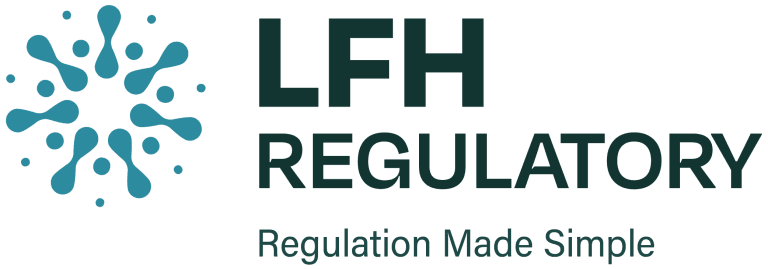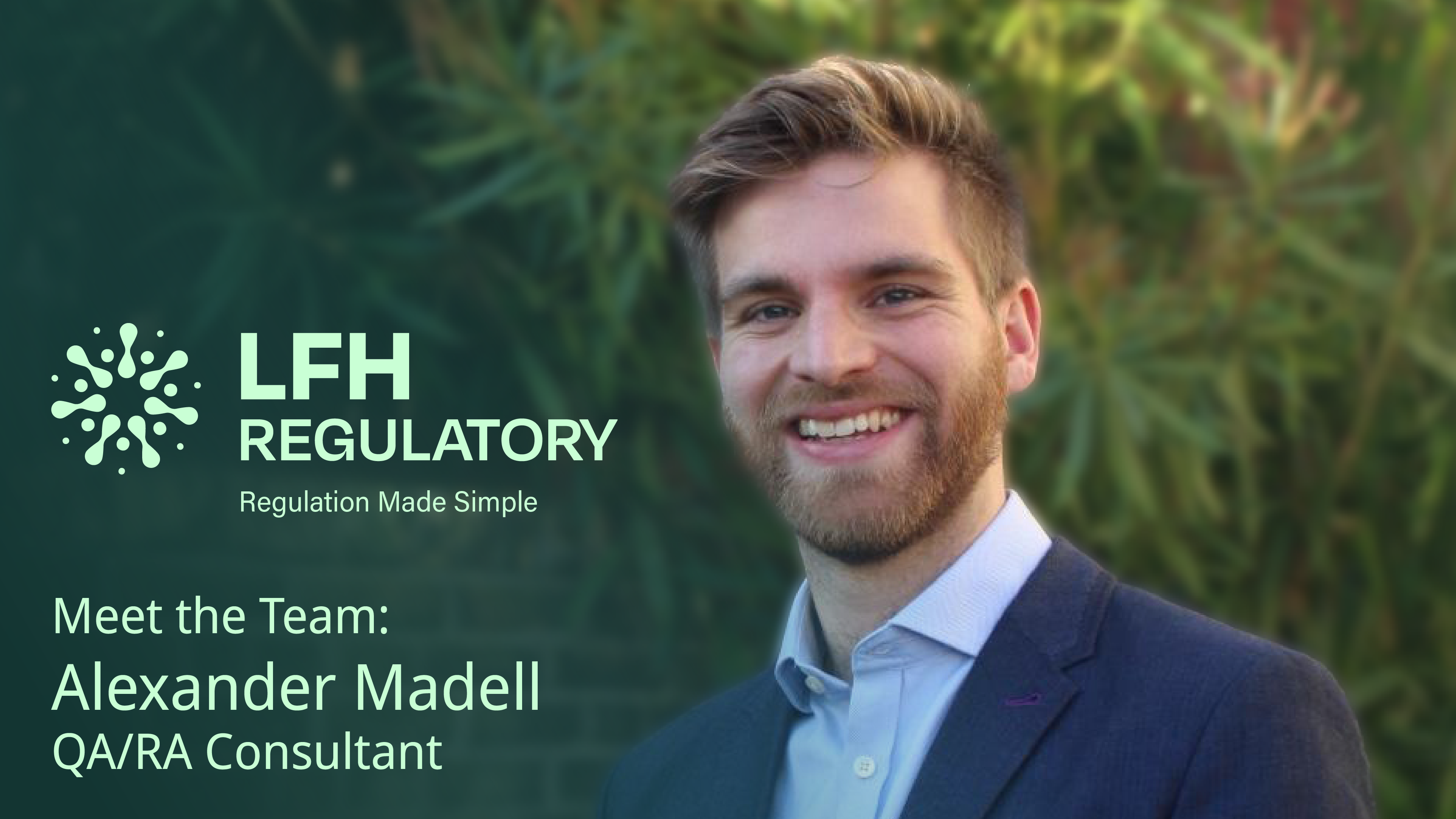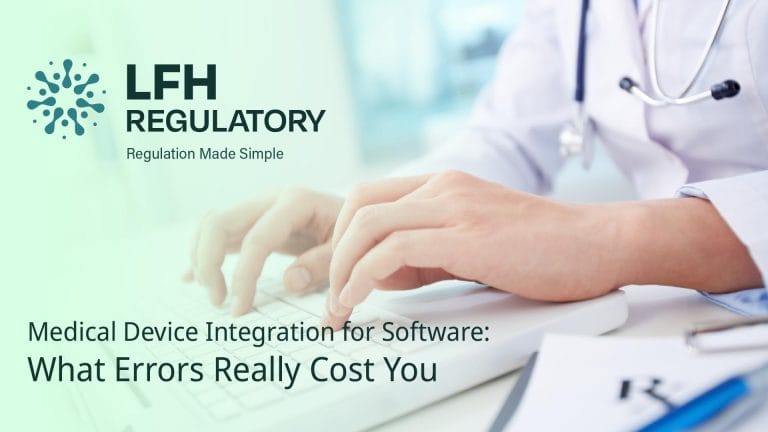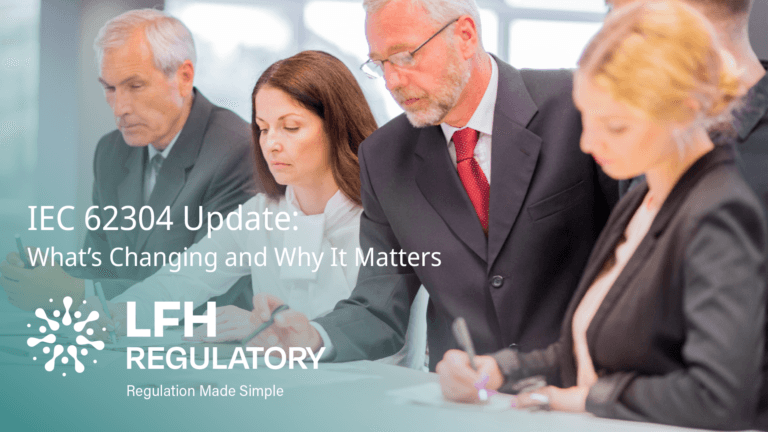As part of our ongoing series highlighting the talented professionals at LFH Regulatory, we spoke with Alexander Madell – QA/RA Consultant, about his career journey, key challenges in the field, and advice for those looking to enter the industry.
Can you give us an overview of your role?
The role is very broad, but largely, I help with anything quality and regulatory-related, particularly in bringing clients’ medical devices to market and maintaining that market access. This can include anything from classifying a client’s product as a medical device to implementing a fully compliant Quality Management System (QMS), and everything in between. The role really captures the entire lifecycle of a medical device product. On the business side of my work at LFH, I also support with blog writing and content creation, so the mix of work is extremely varied and rewarding.
What inspired you to pursue a career in regulatory affairs?
As is probably true for many colleagues in the industry, I didn’t come across regulatory affairs as a career option until quite late on. Towards the end of university, I realised that lab-based work wasn’t for me and that I wanted to work more collaboratively, but still within the life sciences. At the time, the MHRA was in the news with the Covid-19 vaccine development, which sparked my initial interest in learning how a product is developed and brought to market. I actually had the opportunity to work at the MHRA for a time before moving to a medical device manufacturer, and I haven’t looked back since! I love the mix of legal, compliance, and life sciences, and really enjoy playing a part in bringing exciting and life-changing products to reality.
What attracted you to LFH Regulatory, and how has your journey been so far?
Prior to working at LFH, I worked at a few large medical device manufacturers, so I gained a variety of experience from the manufacturing side of the industry. One downside to working in a larger company is the risk of being “pigeon-holed” into a particular department or area. For example, in RA, you could work solely on product registrations and never learn or work on post-market surveillance. Some people like to specialise, but I was conscious that whilst my skills were being developed well in one or two aspects of RA, I still wanted to develop in other areas. I was drawn to consultancy because of the variety of work. LFH Regulatory, in particular, caught my attention as the website was incredibly professional and the company, despite being smaller than others, was producing a lot of useful information and engaging with the wider quality and regulatory community in the form of blogs and LinkedIn posts. I’ve been with LFH for about five months now and have already learned so much. In week one, I was already working on a risk management project for a client. I’ve always felt well-supported and able to ask other members of the team for help whenever needed. The remote working aspect isn’t for everyone, but I personally like the time it gives me to complete focused work when I need to. Plus, every couple of months, we make sure to meet up as a team to discuss business goals, objectives, and what’s going on. We always do something fun and get a chance to know one another outside of work, which is great!
What are some key challenges that come with managing such a diverse range of products?
As I mentioned before, managing a diverse range of products is incredibly stimulating and rewarding, as there’s always something new, but there are definitely downsides to this as well. For example, each product type usually has a corresponding set of quality standards associated with it, and these are often updated regularly, so it’s a full-time job to stay current and keep your knowledge up-to-date across so many different products. Each product will also have its own requirements, which will vary depending on the market it’s placed in, so it can be challenging moving from one product to another and managing conflicting deadlines concurrently.
Can you share a particularly rewarding project where your regulatory expertise made a significant impact?
Many of our clients are still in the development phase of bringing a product to market, so engaging with a regulatory professional makes a huge difference to how, when, and where the product is marketed and the strategy used by the company. Recently, I’ve been involved with a company seeking grant funding. To do this, they need to show a certain level of documentation, which I’ve been focused on completing ahead of the funding deadline. If successful, this will give a huge boost and direction to the future of the company, its product, and ultimately the intended patients who would benefit from the new device.
What does a typical day look like for you?
I try to get up early (especially now that it’s getting lighter), and on most weekdays, I’ll either go for a run or to the gym before work to start the day right!
I’ll log on at 8:30–9am, and the first thing I do is open my emails and Scoro, the task and planning software we use at LFH, to check what’s on my calendar and to-do list for the day. I spend a bit of time each day replying to client emails and looking ahead to other projects coming up.
As I mentioned, my role is really varied, so no two days are exactly the same, especially as client work can change very quickly depending on the availability of information and conflicting priorities. Having software like Scoro is incredibly helpful for planning and adapting at the drop of a hat, so there’s never a dull moment!
In the morning, after any email responses, I work around meetings I might have, whether client-facing or internal, and then I work on anything from a risk management file to a UKRP Registration or document review.
I like to break my day up with a walk at lunch, around 12pm. I’m blessed to have a lovely walk by the Thames estuary just round the corner, so I try to get out for 30 minutes or so.
I’m back at my desk for 1pm and continue with the work from the morning or sometimes like to change tack and work on something totally different. Often that might be prepping a blog post on a current regulatory topic for LFH or researching new developments in the industry.
I close the day out at around 5:30pm and finish up by recording the time spent on client tasks, updating Scoro, and having a quick look at the next day’s work.
On a typical midweek evening, I’ll go for a dog walk or run, do some yoga, or just have dinner and crash out with a book (or more likely Netflix) while spending time with my wife.
Why is keeping up with evolving regulations so important, and how do you stay ahead of changes?
As the devices world changes so rapidly with new and exciting technologies, regulations must evolve to remain applicable and fit-for-purpose. With that, companies that want to stay competitive, expand into new markets, and remain compliant must ensure they’re looking ahead to anticipate industry changes and be prepared for these. If they don’t, a company loses competitiveness and, in the worst-case scenario, will face fines, recalls, loss of market access, and damage to their reputation. We use a tool at LFH to receive crucial updates happening in the wider industry, and we’re part of a few trade associations (ABHI and RAPS), which put on webinars and meetings to disseminate upcoming changes and their potential effects.
What advice would you give to someone looking to start a career in regulatory affairs?
First off, I’d recommend exploring whether pharmaceutical regulatory affairs or medical device regulatory affairs are more aligned with your interests. For any university students, I’d recommend looking at internships and early career opportunities in regulatory affairs or quality assurance, as many companies provide these, and they’re a fantastic way to get a real feel for what the work involves. It will also tell you if that company or role is right for you when the time comes to leave university!
Get involved in groups like ABHI, RAPS, or TOPRA, as these are fantastic networking opportunities and give a taste of where the industry is heading. Finally, reach out to people on LinkedIn and ask questions. Most are usually happy to share what they do, their experiences, and what they enjoy about their chosen career.
Outside of work, what do you enjoy doing in your free time?
I like to stay active, so I try (at the moment, at least) to go to the gym, run, cycle, swim, and do some yoga whenever I have time. Otherwise, I love cooking and taking a UK staycation to unwind with lots of walking and reading. My wife and I recently got our first dog, a beautiful golden retriever called Otis, so he’s definitely been an amazing time-waster with all the training, walking, and cleaning! We also live in an old house, so any spare time not spent binging Netflix is spent DIYing or out in the garden!
- Laura Friedl-Hirst
- Laura Friedl-Hirst
- Laura Friedl-Hirst
- Laura Friedl-Hirst
- Laura Friedl-Hirst
- Laura Friedl-Hirst
- Laura Friedl-Hirst
- Laura Friedl-Hirst
- Laura Friedl-Hirst
- Laura Friedl-Hirst
- Laura Friedl-Hirst
- Laura Friedl-Hirst
- Laura Friedl-Hirst
- Laura Friedl-Hirst
- Laura Friedl-Hirst
- Laura Friedl-Hirst
- Laura Friedl-Hirst
- Laura Friedl-Hirst
- Laura Friedl-Hirst
- Laura Friedl-Hirst
- Laura Friedl-Hirst



